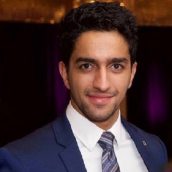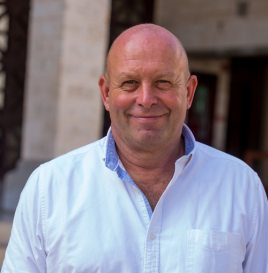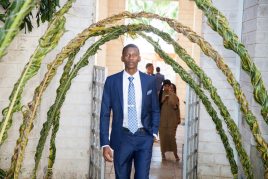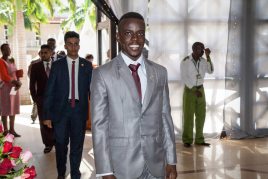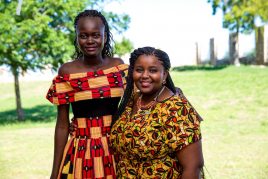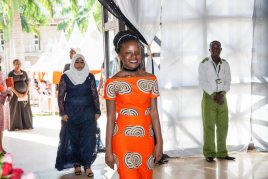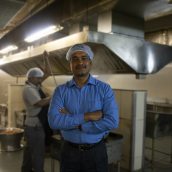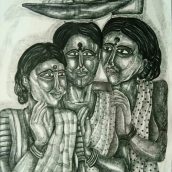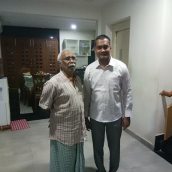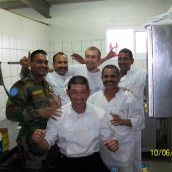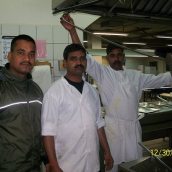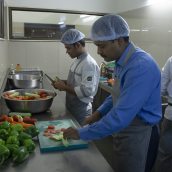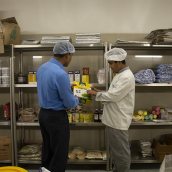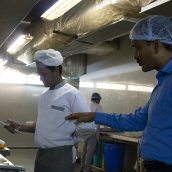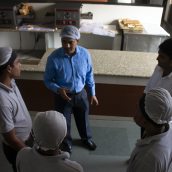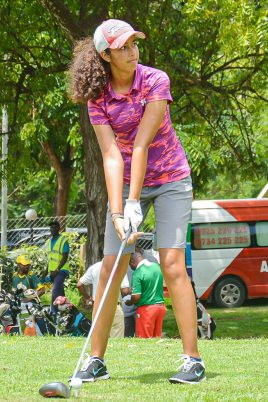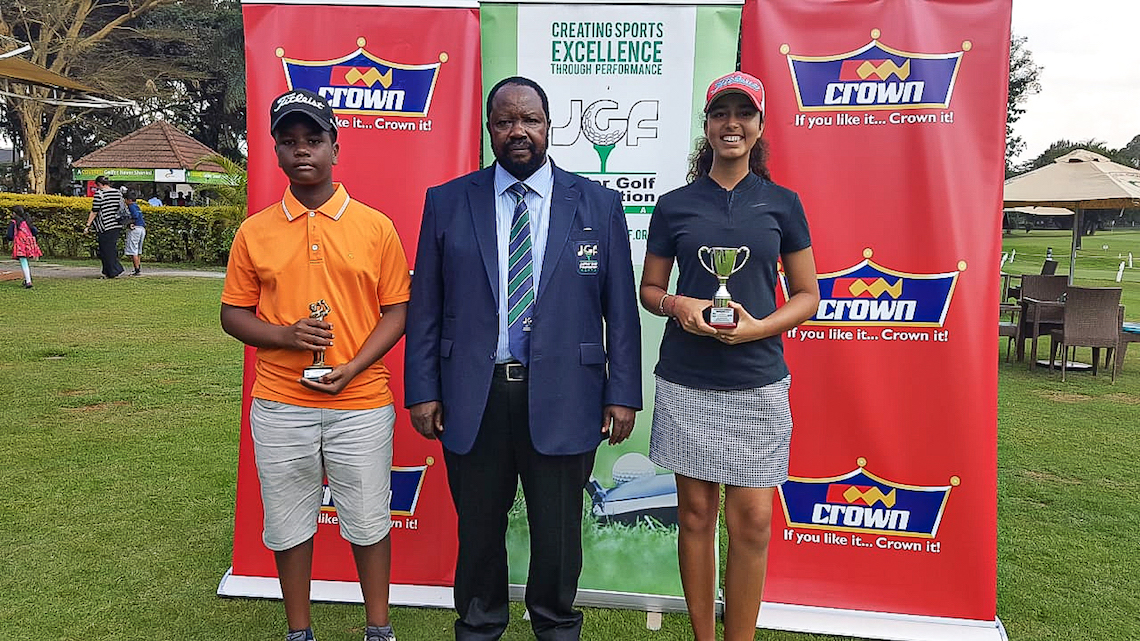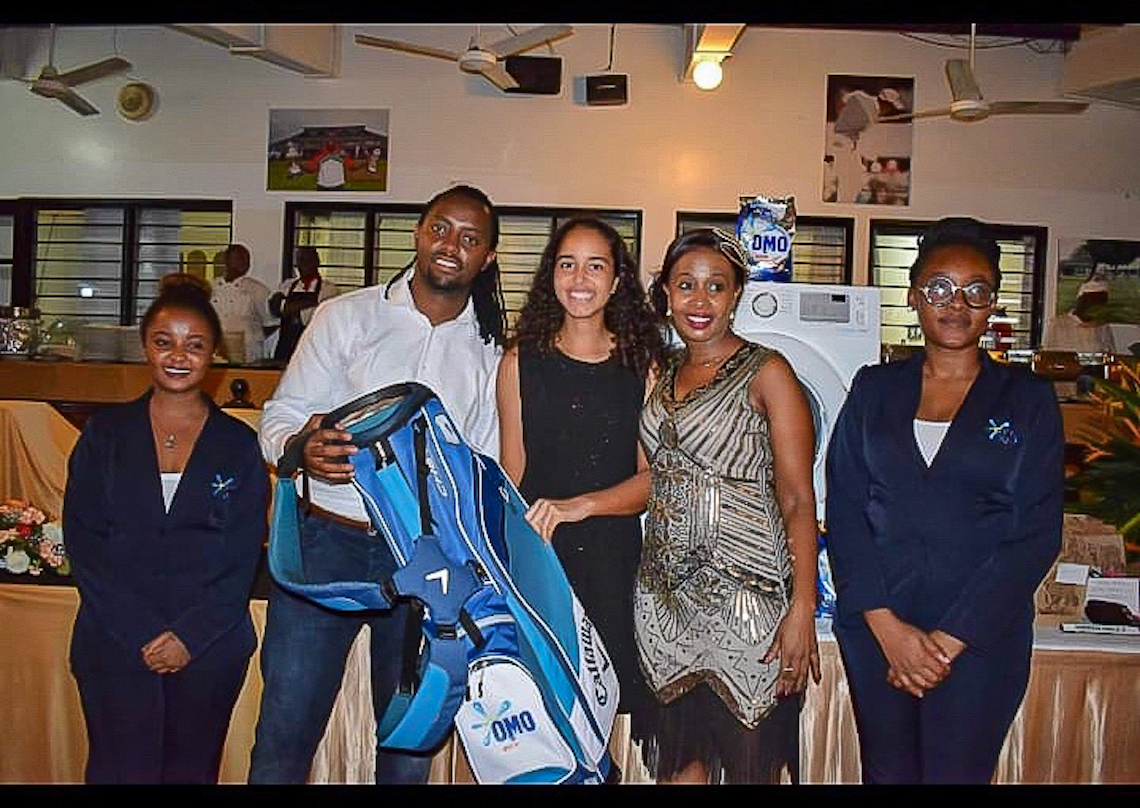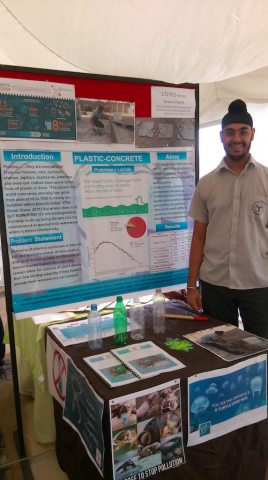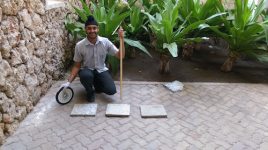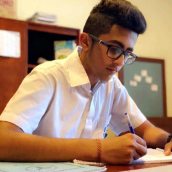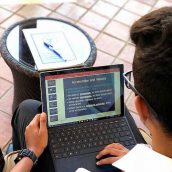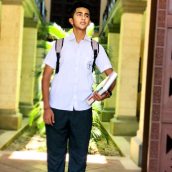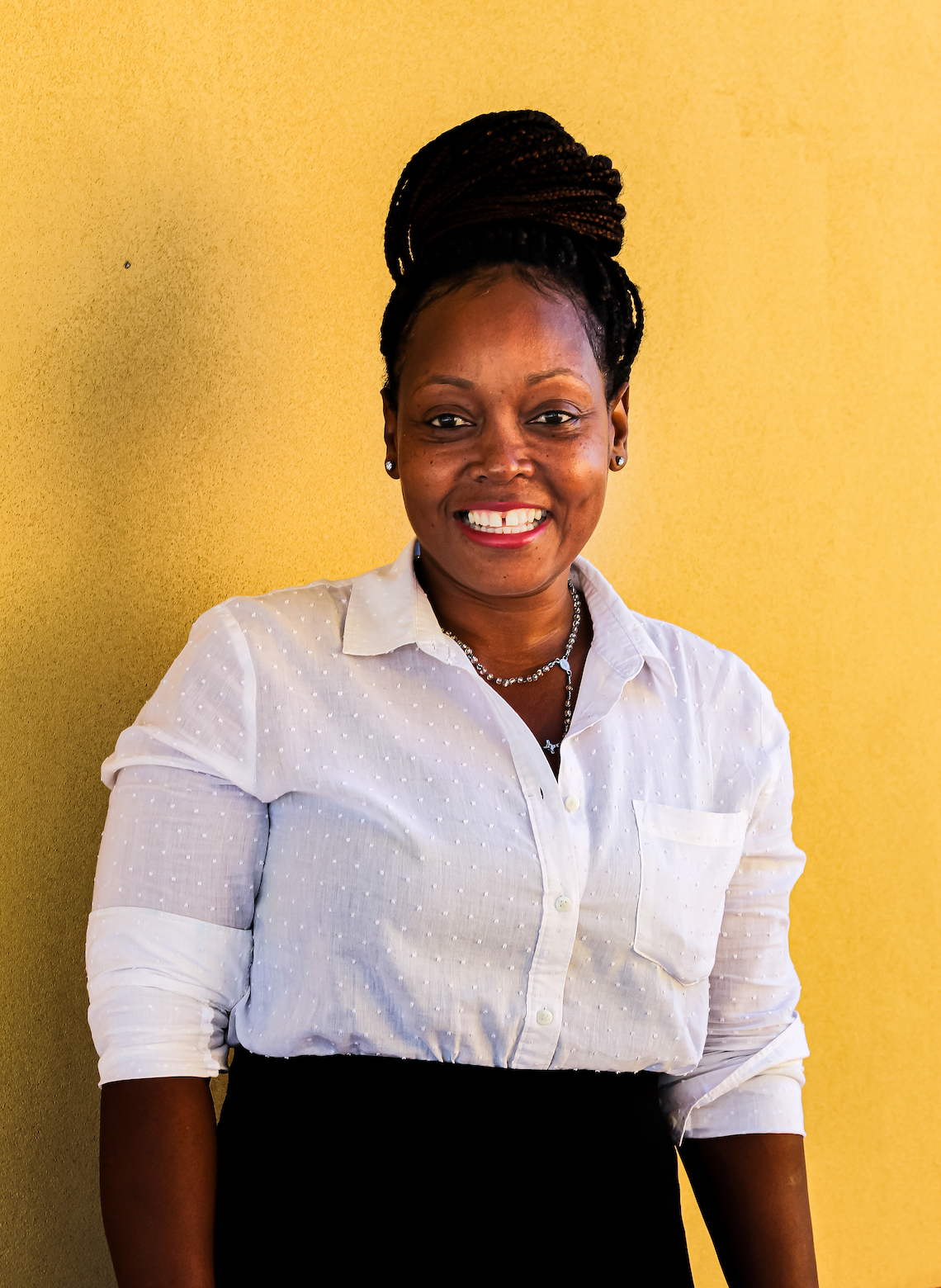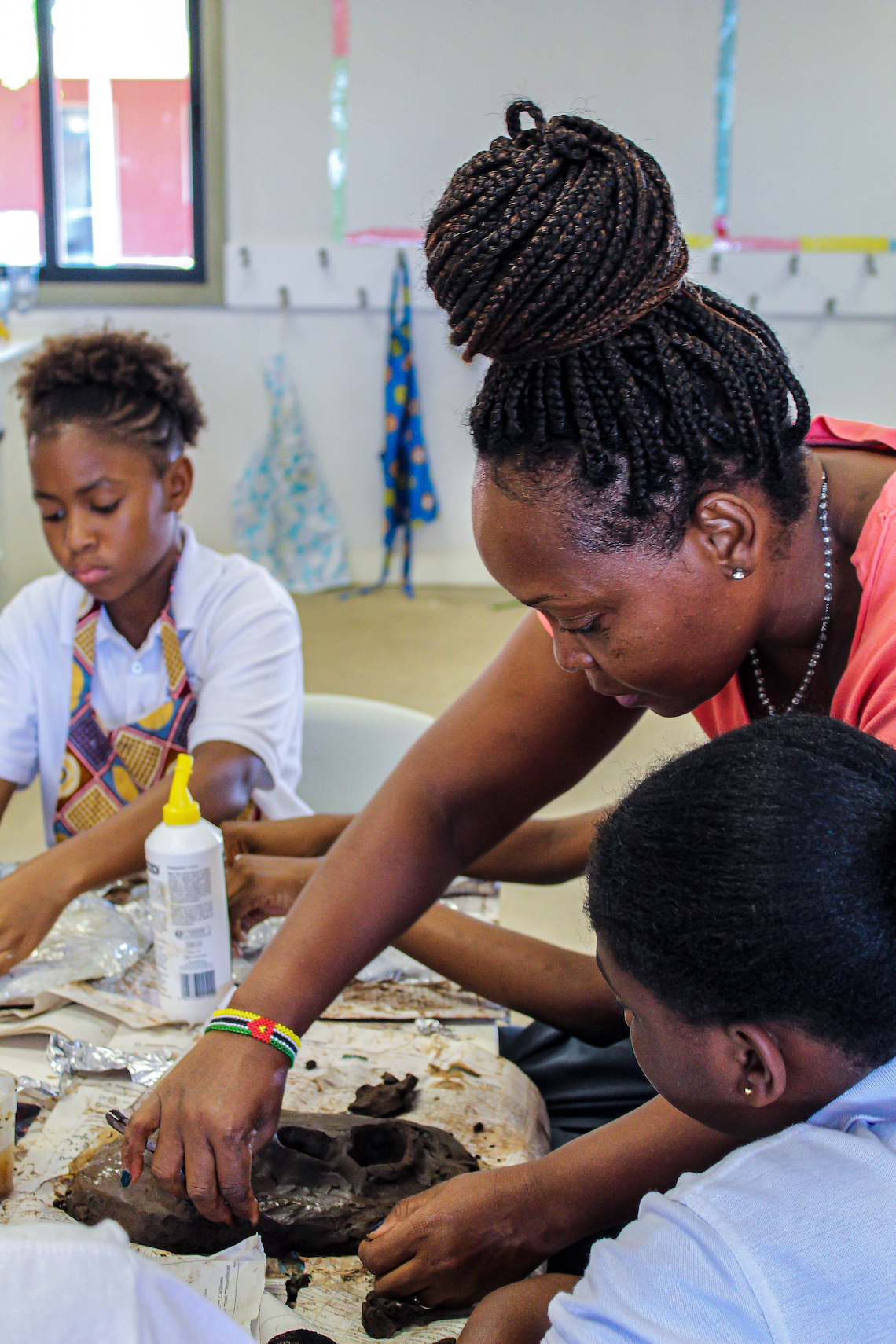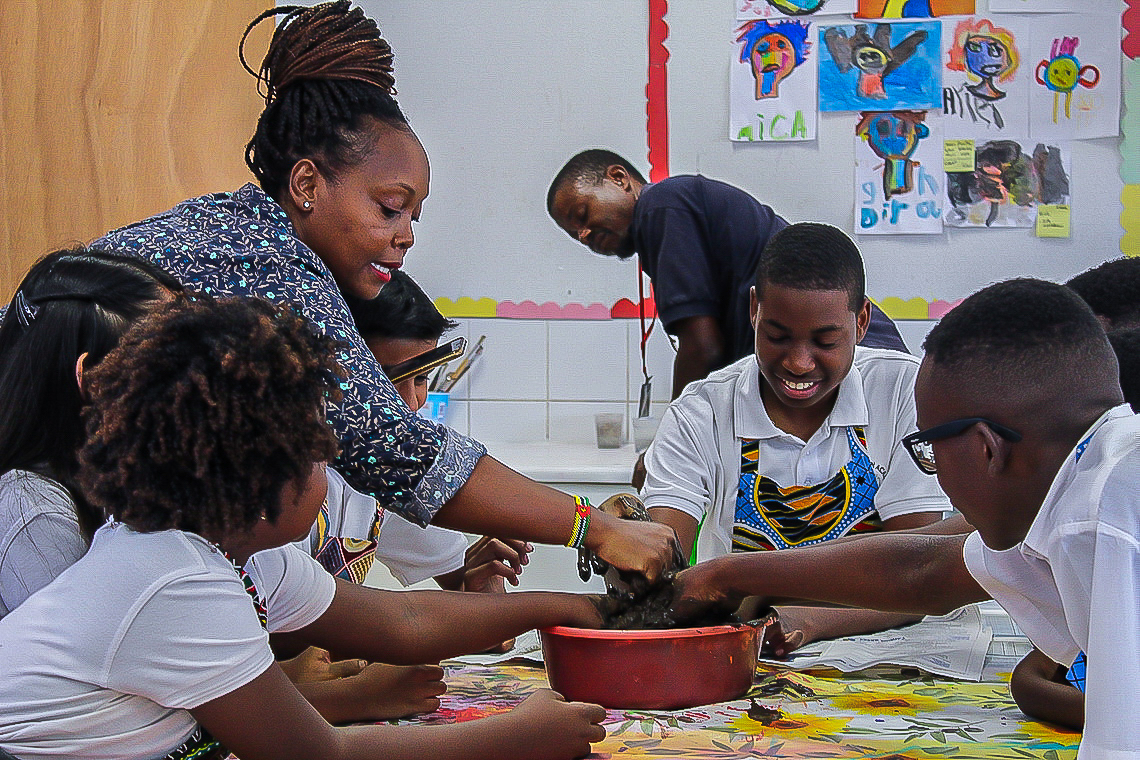Aleem Mawji (Class of 2012): The most powerful weapon
A Hand Up at the Aga Khan Academy
I was born in Dar es Salaam, Tanzania, where I went through Aga Khan Nursery, Primary and Secondary schools. When I was approaching my last two years of secondary education, I started considering a move away from home to prepare for life in university, and the Aga Khan Academy Mombasa came to mind. I had visited the campus in seventh grade for a soccer tournament, and was left amazed by the beauty of the facility.
To be perfectly frank, my family’s financial circumstances would have made it very difficult to attend the Academy; some form of financial assistance was crucial. I was thrilled when AKA saw past the financial difficulty, recognized my accomplishments and potential to excel, and accepted me with a scholarship. I gratefully accepted the scholarship, knowing I had a responsibility to make full use of this immense opportunity. So at age 16 I set out for Mombasa and started with the International Baccalaureate (IB) program!
Learning a New Mode of Thinking; Meeting a New Community
Every day at AKA was challenging, as anyone that has experience with the IB program can certainly attest! Even mathematics presented a new language; I remember having to read a paper on mathematics with the date of publication and page numbers being the only numbers in the entire document! However, my most valuable academic experience was studying the Theory of Knowledge. This course focused very strongly on making one critically examine what it is that we “know.” To this day it has me questioning a lot of premises I would otherwise accept.
While the academic environment was fairly rigorous, it only enforced the already-strong sense of community one would experience in the residential program. One moment, we were scratching our heads over a physics lab report due that evening, and the next, we were plotting ways to sneak into the AstroTurf to kick the soccer ball around! In my opinion, this type of learning environment truly makes the Academy a unique and fulfilling experience. To this day, I still regard many of my dorm-mates as extended family rather than school colleagues.
Path to British Columbia
At the end of my two-year stay in Mombasa, I was honored to receive the Academy’s Medal of Honor for highest academic standing, and Award of Excellence; an all-round award for academics, sports, extracurricular, leadership, and volunteering. I was also nominated by the Academy for the International Leader of Tomorrow Award from the University of British Columbia (UBC). I received this award in the form of a full scholarship to study the program of my choice at UBC’s campus in Vancouver, Canada. While I left the compound of the Academy with immense joy knowing I had fulfilled some expectations placed on me, I felt an even greater sense of responsibility to myself, my family and the Academy given my opportunity to study in British Columbia.
The program I decided to study was Mechanical Engineering. Coming from a family of engineers certainly played a role in this decision, but I most appreciated the versatility of the degree and how the applications of mechanical engineering design spanned a range of industries. Over the course of my degree, I have worked on projects ranging from micro-controller-based autonomous vehicles, to a drip-irrigation system for optimizing use of a limited water supply. I have also spent eight months in the maintenance engineering department of a large copper mine, and have worked on the design of a device to prevent excessive bleeding from an injured limb.
I attribute my desire to work on this wide range of projects to two things: an unwillingness to be satisfied with the knowledge the I possess at any time, and a desire to have a larger positive impact on as many fronts as I can, when I have the capacity to do so. While these are arguably generic traits, my belief in them has been strongly enforced by the people I met at the Academy, and the Aga Khan Academy Learner’s Profile that the institution so strongly stands for and promotes in its students.
Working Together
During my third-year in university, I found myself at a cross-roads. While I enjoyed the versatility of the engineering degree, a part of me knew that becoming a professional engineer may not have been best-suited to my aspirations.
When I was in London visiting my cousin in the summer of 2015, he introduced me to the world of management consulting. Initially, it brought to mind an image of a team in suits, working in isolation, preparing a PowerPoint deck instructing a company on changes to be made to achieve X. I later discovered how out-of-date this impression is. Management consulting, I have found, is all about solving complicated problems that have a large impact on the clients and the community around them. More often than not, this is achieved while working hand-in-hand with the client companies to implement a proposed solution.
I learned more about this industry during a recent internship with McKinsey & Company. During this time, I got to work with a large coal mine that was seeking to reduce its maintenance costs. What was truly unique about this experience was how we were in the field, working with the tradesmen, foremen and managers, asking ourselves questions like “How do we know when best to replace this $300,000 piece of equipment? What actionable change can we make to our maintenance practice? How can we track the effect of this change?” We would draw on the strengths of each other’s backgrounds and figure out practical solutions together! I really appreciate this idea. I don’t want my work to be just theoretical or conceptual. I want to be on the front line, working with the people in question to make these changes tangible.
Harnessing Potential
One project that grew during my undergraduate study was a company that my brother, Naeem, and I co-founded. The company’s goal (to increase the access to electricity for people in Tanzania) was strongly based on values my family instilled, and that were prevalent at my time at the Academy. First, it applied the idea of giving back when one has the capacity to do so – not because we have to, but because we can. Second, it focused on the notion of sustainability and building capacity; not a one-time handout, but an activity that helps people harness their own potential to thrive.
In some ways, I see parallels in the role that the Aga Khan Academy has played in my story. As I approach the end of my undergraduate studies and begin my transition into a professional career, I reflect on the events that have taken place, and the individuals that have played a role to get me to the position I am in. While I owe an unparalleled amount of credit to my parents and two siblings for instilling the right foundation, I cannot overestimate the role the Academy played in my development. I came into the Academy with a scholarship, viewed as a student with potential, and have since become an individual with a stronger belief in my ability to harness my own potential, and that of people around me. That, I believe, is the most powerful weapon.
This spotlight is republished courtesy of AKF USA.
Talent Identification Students: Creators of destiny
One of the great African presidents, Julius Nyerere, once said that the point of education was to turn creatures of destiny into creators of destiny. As the Dean of Admissions and Financial Aid at the Aga Khan Academy Mombasa, I have passionately led a Talent Identification Programme for nearly ten years now. The programme identifies “creators of destiny”, students in Year 6 in Kenyan government schools, in deprived socio-economic and educational areas of Kenya, who are academically able and show leadership potential. This May, seven of these students have fulfilled part of their destiny, in graduating from the IB Diploma Programme. Six of these seven students have secured a path to their next destination in life, by gaining access to some of the best universities in the world, on full scholarships. The Academy has guided and nurtured the students to have the confidence to become “creators of destiny”. The vision of His Highness the Aga Khan is that these students, as well as other members of the 2018 graduating class, will go out and be creators of change in their own communities.
As a teacher, the idea of educating a child for profit has always repelled me. The Academy’s inclusive culture was one of the factors that appealed to me when I first applied for the post at the school, as was the opportunity to lead the Talent Identification Programme. (Coming from a very working class background myself, I know that my parents would never have afforded me the opportunity to gain access to a secondary or higher education, without the assistance of the state system in the United Kingdom). From the outset, I can honestly say that not all teachers were supportive of bringing these students into the school’s residential programme. I did have a picture in my mind of how successful this could be from my work at previous schools, but I must admit, I did have sleepless nights about the scale, severity and scope of it all.
The assessment process in identifying these students has evolved and refined over the years. One very important aspect of innate leadership that is assessed is that of inferential thinking, the ability to make connections across different areas of knowledge. From this graduating cohort, I always remember one of the students exhibited exceptional ability in this area. Japheth Otieno, at the age of 11 then, referred to the inter-relation between governments causing difficulties in a problem solving activity when he mentioned, “Imagine that a Country A is helping Kenya with aid and money. Imagine that another Country B is an enemy of Kenya. Conflict may arise between Countries A and B, as there is suspicion over the reasons for this assistance to Kenya.” In the selection interviews, we look for students who are likely to question their world, have a keen sense of justice and morality, have good verbal communication skills and a sense of extra-curricular involvement. Japheth impressed me with his references to whether there was a multi-level universe or not and his passion for his kitchen garden, where he had initiated some preventative measures for protecting his plants. Japheth has now secured a place with the King-Morgridge Scholarship at the University of Wisconsin Madison in the United States.
I am delighted that this cohort sees the first student from the Ganze area, William Baya, graduating. I remember meeting William for the first time in 2011. At that time, the Kilifi County Governor reported widespread hunger in some parts of the county, especially for families living in the semi-arid areas. Learning in hundreds of primary schools in hunger-stricken parts of the country had been paralysed as the government dispatched emergency relief supplies. It was against this backdrop that we first met William, then a student at Vitengeni Primary School. William had already showed some leadership traits with him being involved as a scout commander and a school prefect. His school felt that he was a responsible and determined pupil. He mentioned about working hard in life so that he could target his goals – his motto at that time was “front ever, back never”. The self-drive William displays from adhering to this motto has guided him through the six years at the school and given him a full scholarship to attend Washington and Lee University in the United States. On learning of this, his father beaming with great pride said, “The Aga Khan Academy Mombasa has transformed my boy and that I am looking forward to him to come back and work for the community to repay the Aga Khan's contribution.”
One unique aspect of the Aga Khan Academy Mombasa, is its double heritage of world-mindedness and its proud East African identity. Since the inception of the school in 2003, Swahili has been compulsory for all students up to 14 years of age. His Highness recognised the need for young leaders to be able to communicate in their national language with other members of their community. (It is interesting to note that other non-national schools have only recently introduced Swahili into the curriculum for all students after a recent government directive). The Academy is at the forefront of academic thinking and is always forward thinking.
The development of the students in the school to “creators of destiny” is by no means left to chance. From this double heritage foundation, important concepts such as those of meritocracy, pluralism, ethics and other virtues and attributes that make up the students’ learner profile, have been integrated into all aspects of the curriculum. The students are allowed to run the risk, among other things, of failure because the privation of not succeeding can be an excellent teacher. Students are also given responsibility so that they can experience and learn from taking leadership roles. This is encouraged in every student. The students take charge in aspects of enrichment, academics and service, so that they are held accountable and answerable for their decisions, both when they get it right and when they fail.
Prudence Hainga after graduating this year will join the University of Edinburgh to study Political Science. Prudence reflected on what this scholarship meant to her and her community. “I want to realise my childhood dream of fighting injustice and corruption in Kenya. Having experienced and witnessed different levels of inequality in my country, I want to delve into a career path that will help me change what has become a detrimental routine in my country. The Kenyan political system is majorly defined by tribalism and inequality. Therefore, learning how political systems function and what others have done to ensure sustainable development as well as spread out opportunities for their citizens, will help me to decipher ways in which I could impact change in my country’s political system and rid Kenya of tribalism and greed. I am motivated to use my knowledge as a weapon against discrimination and inequality and work for a better Kenya – a Kenya that feels like home to all.”
These young men and women who have benefited from this progamme, did not have a great deal when they first came to the Academy, and their future was continually uncertain, with parents struggling to secure jobs, keep food on the table as well as educating their children. To see them grow and nurture and fulfil what was expected of them at this moment in time brings a lot of satisfaction. I have taught in many schools throughout the world, but there is something unique and special about this graduating class and other students at the school. The school recently had a visit from the representative from the International Baccalaureate Organization. On commenting on the school the one thing that stood out in my mind was his reference to the children here. He simply said that the children were “staggering”. These staggering students are helping to fulfil our mission for the Aga Khan Academy Mombasa that fits with building a better Kenya.
By Paul Davis
Dhan Prasad - the Academy's own renaissance man
Dhan Prasad was born in Hyderabad after his parents relocated here from Nepal, and grew up in Red Hills. He joined the Institute of Hotel Management and Catering Technology, completing their Food Production & Patisserie course in the year 1993. In the following years, Dhan Prasad trained and worked at two of the premiere hotels in India, the ITC Grand Chola in Chennai and Oberoi Krishna in Hyderabad (renamed Taj Krishna). It was during this stint in Hyderabad that Dhan Prasad decided to pursue his passion for the arts. “You can call it my first love,” he says.
As a school boy, Dhan Prasad often visited the Jawahar Bal Bhavan in Nampally. The Bal Bhavan, with its high ceilings, yellow walls and large play area was created to be a place where children could hone their talents in the arts, learning music, dance, and, of course, drawing and painting. Here, he trained under artist and National Film Award winner, Thota Vaikuntam, whom he describes as his role model, guru and inspiration. “He used to encourage me by giving me big drawing charts and colours.” Dhan Prasad re-entered university in 1995, this time as a fine arts student at the Jawaharlal Nehru Architecture and Fine Arts University. His art, mainly sketches and acrylic, portray scenes of men and women, often at work, and always in conversation. The paintings are on large canvases, and though they have some of the stylistic attributes of Madhubani art, they are strikingly unique. The Bal Bhavan he went to is still active today and caters to around 3000 children in spite of being under-funded, and sharing its space with a local fire department.
“It was very tough to manage my work and my painting,” he says. Dhan Prasad was juggling university work and his job at the Krishna simultaneously at this time. As the pressure mounted, he was informed that he had been chosen to be Junior Commissioned Officer (JCO) of catering in the Indian Army, a proposition that comes from the desk of the President of India. Dhan Prasad describes joining the army as a bold decision. He remembers thinking, “I cannot ignore this opportunity to serve my country.” So he, in his words, left his white chef’s robes and donned the olive green of the Indian army.
Glad to have the opportunity to serve his country with his culinary abilities, he worked in the army for 19 years, serving in its storeyed institutions across the country and even abroad. Dhan Prasad was among the forces sent from India to be a part of the UN’s mission to maintain ceasefire between Syria and Israel. “My most memorable days were as kitchen manager of an international kitchen at UNDOF (United Nations Disengagement Observer Force), Israel,” he shares. “My most challenging work was at IMA (Indian Military Academy), Dehradun and OTA (Officers Training Academy), Chennai.” In these kitchens, Dhan Prasad organised meals and hospitality services for 2000-2500 people every day. Standing in charge of these large operations gave Dhan Prasad an understanding of the workplace, responsibilities and leadership, which make him revered by those who work under and alongside him.
“Being an army man he brings discipline to our catering,” says Head of Operations at AKA Hyderabad, David Roy. “He’s always on the dot.” Dhan Prasad and David work very closely, and often under high pressure. “In three years, we have never missed catering at a single event, and this is because of our excellent kitchen, its staff, and of course, Dhan Prasad.” It is a great compliment to him that in spite of the demanding nature of their job, Dhan Prasad has created an atmosphere of conviviality in the kitchens and among his support staff. “He understands his job, his responsibilities,” says David. “But the problem with him is that he doesn’t say no to anyone!”
The demands of the Academy’s kitchen are different from those of a military kitchen, and Dhan Prasad relishes the challenges that come with this job. “The diversity [in the students, faculty] gives me an opportunity to challenge myself and be innovative and creative in our day to day catering services,” he says. Dhan Prasad also looks forward to the holy month of Ramzan and being able provide for fasting students at the early hours of dawn. “The Global Encounters holiday camps offer other opportunities to test our calibre,” he adds.
Working at a school, Dhan Prasad believes learning about the mammoth effort that goes into their meals could be beneficial to students’ education. “Students need to have responsibility toward their food." He wants students to be informed about the processes of the food & beverage industry and also about etiquette. “Our students are future ladies and gentlemen who will go out internationally and later become responsible citizens of the nation. Table manners count for a lot when it comes to the personality of an individual.”
At 17, Dhan Prasad knew he wanted to be in hospitality. Today, he is a chef, an artist, and a retired Subedar Major. The praise heaped on him is the kind that Swiss watchmakers pine for. He is efficient, dependable and yet creative. “Art is long and life is short,” he muses. “Cooking is an art and science, it never ends and we can’t master it. The only thing we can do is try, practice and keep doing good work.”
Written by Ajay Sundaram
Alyssa Jamal: Swinging her way toward success
“I started playing golf because of my dad, Aly Jamal, who is also a golfer,” Alyssa said. “As a child I used to accompany my dad and hit balls on the practice range whenever he would go play. That's when he realised that I was good at golf and that’s when I started getting lessons to learn how to play golf from the pros at the Nyali Golf Club.”
Since Alyssa received her handicap in 2015, which is a numerical measure of a golfer’s potential with better players having lower handicaps, she has competed in numerous national and international competitions. Some noteworthy competitions include the U.S. Kids Golf International Competition, the 72 Holes Junior Stroke play Championship, Royal and many more.
“I love the game of golf,” Alyssa said. “It has taught me so many things, for example, etiquette, patience, focus and, most importantly, it has helped me in my social skills. I am passionate about the sport because it also helps me unwind from my busy school schedule.”
Alyssa said golf provides her with many opportunities to connect with different players, form closer bonds with her family and boosts her determination to always succeed.“I’ve met European Tour professionals when competing and when I go for international and national tournaments I meet new people, which has led me to make so many friends,” Alyssa said. “Also, my dad and brother are golfers as well so whenever we travel, we play golf as a family, which is so much fun and it’s a great way of bonding. I have also won so many tournaments and won so many amazing prizes, which is also a great source of motivation for me to prove myself over and over and try to win competitions.”
Although she has been playing for many years, Alyssa said she still finds herself as the only girl competing in golf for her age.“Unfortunately, I’m the only junior girl golfer in the coast,” Alyssa said. “Sometimes I feel bad that I don’t have any girl friends to compete with that are my age. However, there are boy juniors my age that I compete with and they are my good friends. I also know junior golfers from Nairobi, Arusha, Nakuru, South Africa, Scotland and Uganda whom I meet at least once a year when there are national or international competitions, and I keep in touch with them through social media. In Mombasa at the Nyali Golf Club, I play golf with both males and females who are sometimes twice or thrice my age, but they all love and take care of me and they are always happy to play with me. At Nyali Golf Club we are all like a big golfing family and I look forward to going there every single Saturday.”
No matter her age or her busy schedule, Alyssa said golf will always be a part of her life.
“Golf is a sport I will never give up on, even when I get old,” Alyssa said. “You will always find me on the golf course.”
Samantha Caras: Pioneering new approaches to University Counselling
Samantha Caras is from Southern California in the United States and has worked as a University Counsellor at the Aga Khan Academy Mombasa for four years. Her budding journey first began in India where she worked as an Academy Fellow for a year at the Aga Khan Academy Hyderabad supporting the leadership curriculum, helping out with college essay writing and teaching yoga before embarking on her role as a University Counsellor.
During her five years with the Academies, Samantha said her work changed the trajectory of her professional and personal life.
“It showed me that small opportunities, like being sent to a conference can change the course of your life,” Samantha said.
After being mentored in AKA Hyderabad, Samantha set out on a whirlwind experience at AKA Mombasa as a full-time University Counsellor.
“Coming to Mombasa has been exciting because I was able to have a lot of ownership over my work and could structure the office however I wanted,” Samantha said. “The flexibility and creative license I was given allowed me to build and restructure the university counselling programme to fit the diverse needs of our students.” She also said she enjoyed being immersed in many cultures, owing to the diversity of the school, and making friends from all over the world has helped her gain an overseas family for life.
Samantha said what she will miss the most is working closely with the students on their essays, being a part of High-achieving, Low-income (HALI) Access Network (an association of non-profit organisations in Africa that work with high-achieving, low-income students to access international higher education opportunities) and living in beautiful Mombasa. She also said she’s learnt quite a lot professionally, especially about the role of culture and background in higher-education advising.
During her time and position at the Academy, Samantha achieved quite a lot. On a personal level, she managed to finish her Master of Education in International Counselling Psychology, after which she got Minal Shah, the head of student support and well-being, to help her out with a professional internship. For the University Counselling office, Samantha managed to change the structure of the programme to include weekly lessons on topics such as writing a resume; professional communication; writing college essays; mock admissions game; applying for financial aid and scholarships; money matters; budgeting and cost of living abroad; adjusting to life after the Academy; and developed the presentations for these lessons. She also applied for the Academy to become a member of the HALI Access Network, which has increased its visibility and given it access to numerous resources and scholarship opportunities for the Talent Identification programme students over the past four years. Additionally, she contributed to the early drafts of what is now the University Counselling Handbook for the Academies network, set up the office’s social media page on Facebook, and worked with USA-based Ismaili volunteers to develop a sustainable standardised assessment test (SAT) programme for college admissions.
Minal describes Samantha as a warm, open and candid individual who worked well with the students.
“Samantha has built significant bonds with the students she’s worked with,” Minal said. “She always encouraged and pushed the students, who always appreciated her patience, honesty and sense of humour. I will miss working with her and her enthusiasm of making things right for the students. She will be a wonderful addition to any institution she joins.”
For her next plans, Samantha said she will be moving to Quito, Ecuador to work as the college counsellor at an international school.
“It was a difficult decision to leave Mombasa and the Academies, but I am excited for the new experience and to work on my Spanish language skills again,” Samantha said.
Prabhdeep Lochab: Seeking simple solutions to global problems
Being a global citizen, leader and environmental enthusiast is no easy task. Prabhdeep Lochab’s story is a testament to the hard work, dedication and commitment that goes into innovating “green” solutions for a sustainable future.
A second-year Diploma student at the Aga Khan Academy campus in Mombasa, Prabhdeep Lochab was the gold medal recipient at the Golden Climate International Science Fair Olympiad for his “plastic concrete” invention.“I wanted to come up with something unique which was practical and easy to carry out,” Prabhdeep says. For his project, Prabhdeep aimed to alleviate pollution in construction, using plastic in a concrete-mix for construction of infrastructure for non-commercial construction. This concrete could be used to construct walkways, driveways, and parks.
When asked about his motivation to pursue a science project for the fair, Prabhdeep said “I have a personal interest in science and I love inventing and being creative to help find solutions to everyday problems.” The simple yet effective solution Prabhdeep managed to devise exhibits his passion for the sciences, as well as his passion to solve environmental issues on a local and global level.
When reflecting on the process, Prabhdeep claimed that it was very challenging to balance school work and extracurricular activities along with finding time to work on his invention.
“I would come up with a new idea every meeting and it was rejected as being either to simple or relatively complicated to carry out. It was very frustrating but I was committed and I kept on trying,” he says.
He appreciates the meeting time he had during the science club that was offered, as he was able to use that time to discuss his ideas with teachers and create a research plan. “We met once every week on Tuesday to discuss the progress of our ideas and concepts that we wanted to use as our projects. Being a part of this group really pushed me to my limits.”
After much struggle and careful mentoring from his science teachers, Mr Godfrey Kokeyo and Mr Charles Gumba, at the Academy, Prabhdeep’s project progressed to the national level. For Prabhdeep, the experience was already so fulfilling because of the hard work, dedication and commitment that went into creating the project. “I realized what a huge event this was and that it was something big to come as far as I had. I knew that I had achieved something great even if I didn’t win anything,” Prabhdeep shared.
Prabhdeep had the opportunity to represent the Academy and his country, Kenya, at the international level at the Golden Climate International Science Fair Olympiad. His project was shared with various ministers from Kenyan environmental authorities and also in front of a panel of judges, who are all acclaimed scientists in their respective fields. His work was particularly recognized for the detailed lab report, experimentation process and presentation of data using a diverse range of media (graphs, text, etc).
Prabhdeep and his parents were both pleasantly surprised when his project was not only awarded the gold medal in his category, but was also awarded a special prize from the National Environmental Management Authority.
For Prabhdeep, this opportunity was so rewarding as he claims it helped him increase awareness of his personal strengths and helped him grow as an individual.
Through this experience, not only was Prabhdeep able to devise a simple solution to help alleviate pollution, but he was also able to apply skills learned in the classroom at a practical level such as writing lab reports and representing data. His hard work, dedication and commitment to make the world a better place is evident in the accolades his project received at the Golden Climate International Science Fair Olympiad.
By Karishma Bhagani
Saifan Aswani: Helping the environment through reflection and determination
Incredible things happen when you slow down. When you take the time to look, listen, watch and reflect. You see the beauty and apparent simplicity in the world around you.
Saifan Aswani, a student at the Aga Khan Academy Mombasa, knows the value of taking the time to appreciate his surroundings. In fact, he says he is “bonded with nature”, and loves to sketch and photograph natural landscapes. His ambitions would see him taking to the skies in the field of aeronautics, bringing his passion for being in nature to another level.
Saifan’s penchant for reflection has instilled in him tremendous gratitude for his current good fortune to be studying at the Academy. He shares his personal journey of growth since arriving in Mombasa from the Congo: “Before I joined, I used to be a student who didn’t work hard and wasn’t independent. Coming to this Academy has changed a lot for me, not only increasing my knowledge of the concepts taught, but also developing self-respect and respect for others.” He continues, “The Academy doesn't only teach theories, but connects the concept to the real life. Living here makes me learn more about cultures as we have students and dorm parents who come from diverse socio-economic backgrounds.”
When you add all this up – a deep sense of reflection, an appreciation for nature and an education designed to support students to connect with others and improving the world around them – it is no wonder that Saifan has recently won an award for his work in the field of environmental studies.
Taking part in the seventh edition of the Golden Climate International Environmental Project Olympiad and representing Kenya and the Academy, Saifan won a gold medal in the agriculture category for his creation of a desalinisation unit.
Saifan first thought of his project idea in 2017 while contemplating the Indian Ocean which graces the shores of Mombasa near the Aga Khan Academy’s campus – he had slowed down, taking the time to look, watch and reflect. As Saifan explains, the salty water of the Indian Ocean can hinder the growth of plants in the surrounding area. Saifan developed a desalinisation unit as a low-cost, eco-friendly solution to this problem. He hopes it will help the local flora and develop more productive agricultural practices.
Compassionate and motivated, Saifan explains that, “The innovation came up as a result of research and investigating local issues surrounding my environment.” He then designed and built the desalinisation unit himself. In the same way that an artist combines simple shapes into a masterpiece, Saifan imaginatively transformed natural processes into a solution with real life applications: “The innovation consists of basic applications I studied in class: evaporation, condensation and solar energy.”
As the youngest participant from his school, he encountered many challenges in creating his award-winning design. The determined and hard-working Saifan recalls sound advice from his supervisor that helped him to persevere: "He told me, ‘I'm not telling you it’s going to be easy. I'm telling you it’s going to be worth it.’"
Throughout his time at the Academy, Saifan has realised that there was more to education than concepts, numbers and exams. As he says, “We are the leaders of the future.” He credits his experience of the past three years at the Academy for instilling in him the discipline of hard work, an appreciation of diverse cultures and the motivation to pursue this responsibility. As he has learned, “There is no elevator to the floor of success. You have to take the stairs!"
By Asif-Aly Penwala
Rosa Jorge: Encouraging expression through the arts
A new arrival at the Academy in Maputo, Rosa completed the Academies’ Teacher Preparation Programme (TPP) at the AKA Mombasa in December 2019. Calling it one of the most rewarding experiences of her life, she lauds the Problem-Based Learning (PBL) Sessions for pushing her to be a better teacher.
Looking back at her TPP journey, Rosa recounts, “I, personally, have seen myself grow as a teacher and a social individual. The experience has changed the way I approach the teaching and learning process. As teachers, it is possible to change the world through education – all we have to do is believe in that and go do it!”
Drama in the family
She began her now 20-year journey with drama from the nascent age of 14. When her brother and friends were taking up extra-curricular activities such as swimming and football, Rosa’s only interest was joining Mutumbelinhas, a local children’s theatre group. She credits her aunt, who ran the group, for helping her break away from her shy persona. “My hubsand put together a play called ‘Ziraldo’ based on the Brazilian writer's life. It was such a big change for me because I was a shy kid and through drama, I became a different person,” she recounts.
Since then, the stage has become her life. It is where she met her husband, who is a director of the Mbeu theatre group and a teacher at Universidade Eduardo Mondlane. It is also the field of work for her son, a theatrical producer and her sister, an actress.
Empowering students with confidence through arts and drama
She hit the ground running in Maputo taking on her role as the Academy’s Drama teacher in January 2020. One of Rosa’s passions include organising workshops promoting self-expression, believing these are key in providing different methods of communication – be it, art, movement, singing, or dialogue and bringing children out of their comfort zone in a safe space. Rosa explains, “Through these workshops, children simply react to the directive and break out of their shell, forgetting that they were shy in the first place.”
Drama goes beyond the stage for Rosa who has been bringing to the fore issues of local cultures and traditions. Over the past few weeks, she has invited many artists to speak about the ethnic groups of Nyau and Mapiko, whereby the children have been learning through the method of mask making and movement classes. Drama has always been more than just performance for Rosa who said, “...it is a very strong tool to build various capacities within young students. It sharpens their communicative, social, collaborative and emotional skills.”
Geared to take on the years to come, Rosa shared that she can already see the seeds of transformation taking root in some students. “I believe that my training in theatre supplemented by the International Baccalaureate (IB) curriculum will present the opportunity to pick up the diamonds in the rough and shine them up,” she explained. “In my opinion, it is important to have Drama as part of a balanced school curriculum in order to develop a socially, emotionally and culturally-aware individual.”
